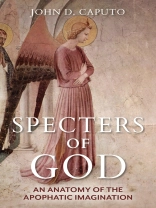In Specters of God, John D. Caputo returns to the original impulse of his work, the ‘mystical element’ in things, here under the name of an ‘anxious apophatics, ‘ as distinct from an ‘edifying apophatics’ anchored in unity with God. In dialogue with Schelling, a new turn for him and the lynchpin of this argument, Caputo addresses the nocturnal powers in being, the specters that haunt our being and bring us up short. The result is an erudite and insightful analysis—in his usual lively and masterful style—of several key ‘spectral’ figures from medieval angelology and Eckhart’s Gottheit, through Luther’s deus absconditus and Schelling’s ‘Satanology, ‘ to the spectralization and virtualization of the world in the ‘posthuman’ age. Arguing that the name of God is not the master name of a super-being who is going to save us but a placeholder for sources deep in our apophatic imaginary, he asks, Has ‘God’ become a (holy) ghost of the past? A passing spectral effect of the ancient harmonies of the spheres? Does radical thinking culminate in a cosmopoetics beyond theism and its theology, in a doxology to the transient glory of the world, whatever it was in the beginning, however eerie its end, world without why?
สารบัญ
Acknowledgments
Preface: The Apophatic Imagination
Introduction: Specters of God
1. Theopoetics: A Phenomenological Genesis
Part One: The Ontotheological Imaginary
2. From an Edifying to Anxious Apophatics: Aquinas, Eckhart and Luther
3. Hegel at the Foot of the Cross: Understanding the Death of God
4. Schelling and the Metaphysics of Evil
5. The Philosophical Meaning of Satan
6. Why Is There Something Rather than Nothing at All? Schelling and the End of Idealism
7. Schelling’s Either/Or
8. Hegel and Schelling: The Critique and the Scarecrow
Part Two: The Hauntological Imaginary
9. Theism Transcended: The Post-Theism of Paul Tillich
10. Violence and the Unconditional: The Politics of the Apophatic
11. Haunting Tillich: Spectralizing the Ground of Being
12. The Devil is in the Dissemination
Part Three: The Posthuman Imaginary
13. Angelology—Posthuman Style: Would You Rather Be a Cyborg, a Posthuman or an Angel?
14. Ruinology: Why Will There Be Nothing at All, Rather than Something?
15. Axiology: A Mortal God, A World without Why
Conclusion: The Name (of) ‘God’
Notes
เกี่ยวกับผู้แต่ง
John D. Caputo is the Thomas J. Watson Professor of Religion Emeritus at Syracuse University and the David R. Cook Professor of Philosophy Emeritus at Villanova University. His many books include The Weakness of God, The Insistence of God, and Cross and Cosmos.







![ปกของ Brian Schrag & Julisa Rowe: Community Arts for God's Purposes [Chinese] 貼近神心意的社群藝術 ปกของ Brian Schrag & Julisa Rowe: Community Arts for God's Purposes [Chinese] 貼近神心意的社群藝術](https://static.worldofdigitals.com/thumb_webp/740/9781645083740.webp)




